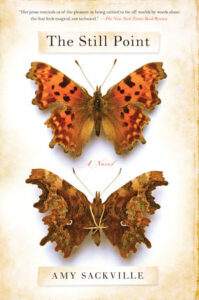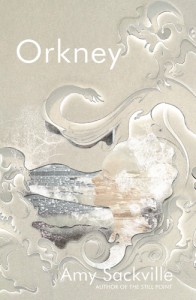Amy Sackville
Amy Sackville was born in 1981. She studied English and Theatre Studies at Leeds, and went on to an MPhil in English at Exeter College, Oxford, and an MA in Creative & Life Writing at Goldsmiths. Her first novel was The Still Point. She teaches creative writing at the University of Kent.
Subscribe to our newsletter for news & events from Counterpoint Press.
Books
The Still Point
A Novel
At the turn of the twentieth century, Arctic explorer Edward Mackley sets out to reach the North Pole and vanishes into the icy landscape without a trace. He leaves behind a young wife, Emily, who awaits his return for decades, her dreams and devotion gradually freezing into rigid widowhood.A hundred years later, on a sweltering mid–summer's day, Edward's great–grand–niece Julia moves through the old family house, attempting to impose some order on the clutter of inherited belongings and memories from that ill–fated expedition, and taking care to ignore the deepening cracks within her own marriage. But as afternoon turns into evening, Julia makes a discovery that splinters her long–held image of Edward and Emily's romance.
The Still Point moves through past, present, and future, with dreams revealing a universal simultaneity to the choices we must all make in the faces of love and passion. Long–listed for the Orange Prize, The Still Point is a powerful literary debut, masterfully told in the language of the heart.
Orkney
A Novel
“A haunting novel” about sex and obsession, set off the coast of Scotland and “full of otherworldly emotion and strange impulses” (Marie Claire).A professor marries his prize student, a woman forty years his junior, and at her request, he takes her to the sea for their honeymoon. His life’s work is a book about enchantment–narratives in literature, most of them involving strange girls and women—but soon he finds himself distracted by his own enchantment with his new white–haired young wife. They travel to the Orkney Islands, the ancient Mesolithic and Neolithic site north of the Scottish coast, a barren place of extraordinary beauty known as “the Seal Islands.” And as the days of their honeymoon pass, his desire and his constant, yearning contemplation become his normality. His mysterious bride becomes his entire universe. He is consumed . . .
From the author of The Still Point, a winner of the John Llewellyn Rhys Memorial Prize, this is a novel that “will appeal to literature aficionados: a Lolita–esque love, a romance born out of academia, and folklore come to life” (Booklist).
“What begins as a familiar, almost fairytale–like narrative ends as something more fragmented, unsettling, and odd . . . Providing a brooding, bruised, ever–changing backdrop to all this is Orkney, the book’s most compelling character of all. In a tribute to Virginia Woolf’s experimental masterpiece, The Waves, the sea in Orkney functions as a kind of rhythmic talisman, its ebb and flow mirrored in the actions, ideas, and themes of the book. More than anything, Sackville’s Orkney is a breathtaking place in the most literal of senses.” —The Scotsman

Catapult | Counterpoint | Soft Skull
20 Jay Street #704
Brooklyn, NY 11201
646.926.0805 | contact@catapult.co






